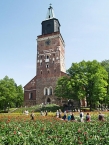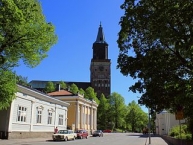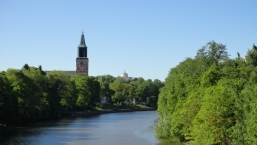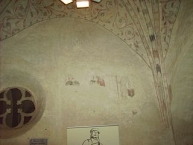Dom von Turku
Worth visiting
Added on 15 Apr 2013,
last edited by Ottocolor on 16 Apr 2013
Nearby cycle routes and tours
| Route name | Type | Dist. to route |
|---|---|---|
Route | 0,1 km | |
Route | 0,1 km | |
Route | 0,1 km | |
Route | 0,1 km | |
Route | 0,1 km |
![]()
Please wait - map data are loading
Type of sights
Church/cathedral
Name and address
Dom von Turku
Turku cathedral
∎∎∎∎∎∎∎∎∎∎∎∎∎∎∎∎ ∎
FI-20500 Turku
GEO-data
Geodetic coordinates
60.45∎∎∎∎ 22.27∎∎∎∎
Elevation
12 m
Communication
Phone
+358 ∎ ∎∎∎∎∎∎
Fax
+358 ∎ ∎∎∎∎∎∎
Internet
∎∎∎.∎∎∎∎∎∎∎∎∎∎∎∎∎∎∎∎.∎∎/
Information about copyright | |
|---|---|
Rights owner | Andrei Niemimäki from Turku, Finland |
Rights characteristic / license | by-sa: CREATIVE COMMONS Attribution-ShareAlike |
Link to the description of the license | |
Image taken over from | |
Image has been uploaded | by Ottocolor on 15 Apr 2013
|
Information about copyright | |
|---|---|
Rights owner | DreferComm |
Rights characteristic / license | by-sa: CREATIVE COMMONS Attribution-ShareAlike |
Link to the description of the license | |
Image taken over from | |
Image has been uploaded | by Ottocolor on 15 Apr 2013
|
Information about copyright | |
|---|---|
Rights owner | Mulberry24 |
Rights characteristic / license | by-sa: CREATIVE COMMONS Attribution-ShareAlike |
Link to the description of the license | |
Image taken over from | commons.wikimedia.org/wiki/File:Aura_River_and_Turku_Cathedral,_Turku_(20110603).jpg |
Image has been uploaded | by Ottocolor on 15 Apr 2013
|
Information about copyright | |
|---|---|
Rights owner | Harri Blomberg |
Rights characteristic / license | by-sa: CREATIVE COMMONS Attribution-ShareAlike |
Link to the description of the license | |
Image taken over from | commons.wikimedia.org/wiki/File:Helga_Korsets_kapell_i_Åbo_domkyrka,_den_27_juni_2007,_bild_5.jpg |
Image has been uploaded | by Ottocolor on 15 Apr 2013
|
Turku Cathedral (Finnish: Turun tuomiokirkko, Swedish: Åbo domkyrka) is the Mother Church of the Evangelical Lutheran Church of Finland
, and the country's national shrine
. It is the central church of the Archdiocese of Turku
and the seat of theArchbishop of Finland
, Kari Mäkinen
. It is also regarded as one of the major records of Finnish architectural history.
Considered to be the most important religious building in Finland, the cathedral has borne witness to many important events in the nation's history and has become one of the city's most recognizable symbols. The cathedral is situated in the heart ofTurku next to the Old Great Square
, by the river Aura
. Its presence extends beyond the local precinct by having the sound of its bells chiming at noon broadcast on national radio. It is also central to Finland's annual Christmas
celebrations.
The cathedral was originally built out of wood in the late 13th century, and was dedicated as the main cathedral of Finland in 1300, the seat of the bishop of Turku
. It was considerably expanded in the 14th and 15th centuries, mainly using stone as the construction material. The cathedral was badly damaged during the Great Fire of Turku
in 1827, and was rebuilt to a great extent afterwards.
As the town of Turku began to emerge in the course of the 13th century as the most important trading centre in Finland, the Bishop's see of the Diocese of Finland was transferred from its previous location at Koroinen , some distance further up on the bank of Aura river, to the middle of the town. By the end of the 13th century, a new stone church had been completed on the site of the former wooden-built parish church on Unikankare Mound, and it was consecrated in 1300 as the Cathedral Church of the Blessed Virgin Mary
and Saint Henry
, the first Bishop of Finland.
At its earliest the cathedral was smaller than the present building. Its east front was where the pulpit stands now, and its roof was considerably lower than at the moment. Extensions were made to the cathedral throughout the Middle Ages. During the 14th century a new choir was added, from which the octagonal Gothic pillars in the present chancel
originate. Throughout the Middle Ages, the High Altar
was located opposite the easternmost pillars of the nave
, until it was transferred to its present location in the apse
, in what had previously been the Chapel
of All Saints, in the mid-17th century.
During the 15th century, side-chapels were added along the north and south sides of the nave, containing altars dedicated to various saints. By the end of the Middle Ages these numbered 42 in total. The roof-vaults were also raised during the latter part of the 15th century to their present height of 24 meters. Thus, by the beginning of the Modern era , the church had approximately taken on its present shape. The major later addition to the cathedral is the tower, which has been rebuilt several times, as a result of repeated fires. The worst damage was caused by the Great Fire of Turku
in 1827, when most of the town was destroyed, along with the interior of both the tower and the nave and the old tower roof. The present spire of the tower, constructed after the great fire, reaches a height of 101 meters above sea level, and is visible over a considerable distance as the symbol of both the cathedral and the city of Turku itself.
Information about copyright | |
|---|---|
Rights characteristic / license | by-sa: CREATIVE COMMONS Attribution-ShareAlike |
Link to the description of the license | |
Input taken over from: |
Turku Cathedral. (2013, February 27). In Wikipedia, The Free Encyclopedia. Retrieved 19:31, April 15, 2013, from http://en.wikipedia.org/w/index.php?title=Turku_Cathedral&oldid=540951775 |
taken over / edited on | 15 Apr 2013
|
taken over / edited by |
|
Hours of opening:
Daily 9 a.m. - 7 p.m.
(in the summer till 8 p.m.)
Please observe services and events.
Nearby cycle routes and tours
| Route name | Type | Dist. to route |
|---|---|---|
Route | 0,1 km | |
Route | 0,1 km | |
Route | 0,1 km | |
Route | 0,1 km | |
Route | 0,1 km |
Added on 15 Apr 2013,
last edited by Ottocolor on 16 Apr 2013




